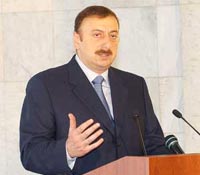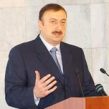
ALIYEV ISSUES NEW DECREES TO IMPROVE ELECTION TRANSPARENCY
Publication: Eurasia Daily Monitor Volume: 2 Issue: 201
By:

A combination of international pressure and domestic tension has forced the Azerbaijani authorities to make several significant concessions regarding the November 6 parliamentary elections. Speaking at the October 25 governmental session, President Ilham Aliyev outlined new measures to ensure a transparent and democratic electoral process. Following that meeting, he signed a new presidential decree that contains a number of suggestions for the parliament and Central Election Commission (CEC) regarding the improvement of the electoral process.
Foremost, President Aliyev advised the CEC to use invisible ink to mark voters’ fingers. This procedure has been one of the top demands of both the domestic opposition and the international community, including the Council of Europe, OSCE, and the United States. This measure, they argue, would prevent one of the most frequent types of election fraud — multiple voting. For several months, the Azerbaijani government has refused to accept this suggestion. Local media have repeatedly cited the chief of the Presidential Administration, Ramiz Mekhtiyev, a powerful decision-maker in domestic politics, as saying, “Inking goes against the mentality of Azerbaijanis.” Instead, the Central Election Commission has been distributing voter cards, aimed at making sure that each voter casts only one ballot. Yet, in the past two months, foreign and domestic election observers have received thousands of complaints from citizens and candidates about problems related to the voters cards; some citizens did not receive any while others received several.
Another important concession made by the Azerbaijani authorities on October 25 was to permit local NGOs to monitor the elections. The law on NGOs bars domestic organizations receiving more than 30% of their funding from abroad from observing the elections. President Aliyev has recommended that parliament lift this ban, effectively opening the door for thousands of local NGOs to monitor the voting process.
Finally, President Aliyev once again stressed to all the local governors the importance of providing equal conditions for all candidates, including granting them space to hold town-hall meetings with the voters and not limiting their poster campaigns. On the same day, the U.S.-based National Democratic Institute received a long-expected invitation to observe elections, another thorny point in Baku’s relations with the West.
These new measures supplement the May 11 Presidential decree that was issued to improve the electoral process in the country. Both the Council of Europe and OSCE have welcomed the October 25 measures. A number of Western ambassadors in Baku, including U.S. Ambassador Reno Harnish, also hailed the decree. Even the opposition parties spoke favorable of the President’s decision. Sources in diplomatic circles claim now that the U.S. Embassy is trying to persuade the Azerbaijani authorities to use visible ink instead of invisible ink. Analysts also expected that U.S. Vice-President Dick Cheney would insist on visible ink in his phone call with President Aliyev on October 26.
While some local and international observers insist that President Aliyev’s measures are nothing but a political show, aimed at fooling Azerbaijan-watchers, others believe that the decree is a real effort on the part of the President to ensure fair voting. It was clear from the beginning of the electoral campaign that Azerbaijani authorities, having witnessed the “color revolutions” in Georgia, Ukraine, and Kyrgyzstan, were determined to make some improvements in the elections in the country. That is why almost all of the 2,000 candidates were registered without problems, the ban on holding mass rallies was lifted, political prisoners were freed and allowed to run for the office, a U.S.-funded exit poll was allowed, and free air time on state and public TV was allocated for the candidates.
Yet, the initial successes of the election campaign were later ruined by clashes between police and opposition demonstrators in central Baku as well as by the increasing reports from the districts about local executive officials directly interfering in the campaign process. It was becoming clear that this pattern of developments would damage the international legitimacy of the November 6 elections. Thus, President Aliyev made another bold move to ensure that the elections gain overall credibility in the eyes of Western as well as local observers.
Many Western observers regard the upcoming parliamentary elections in Azerbaijan as a critical test of Azerbaijan’s commitment to democracy, as well as of Western plans to intensify partnership with official Baku or not. It is clear that while Azerbaijani authorities are determined to maintain a majority in parliament, a group within the ruling party is also concerned about international legitimacy and is thus striving to improve the process.




